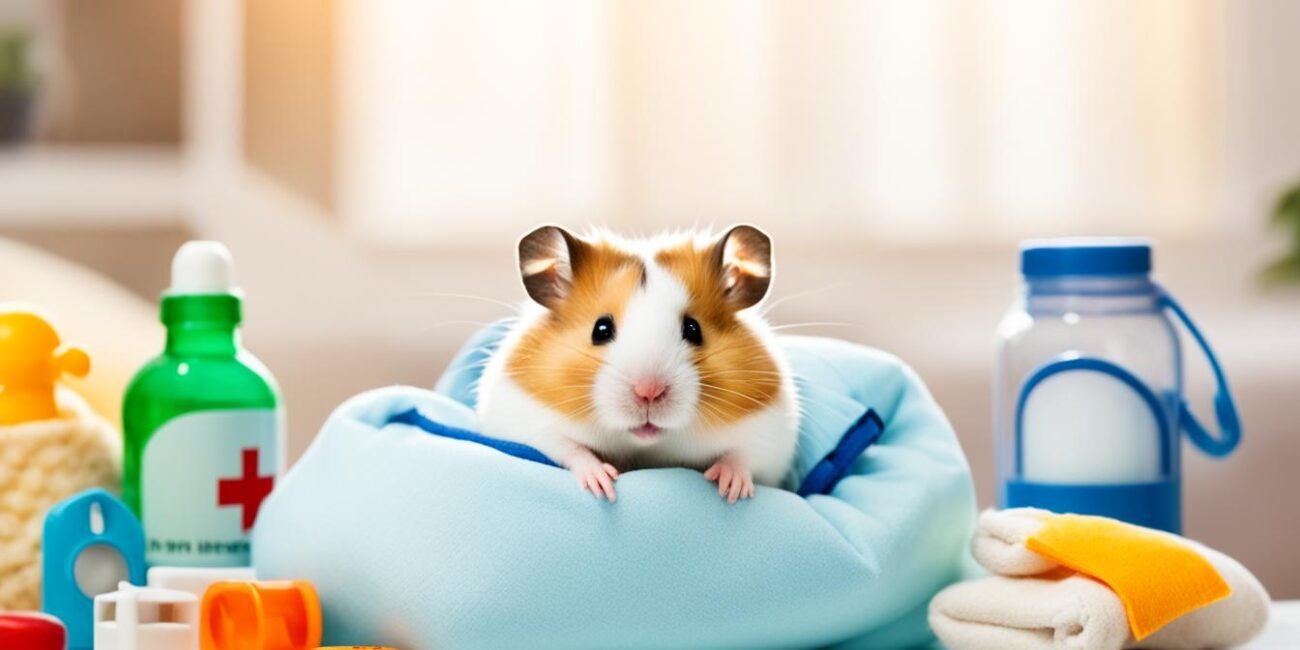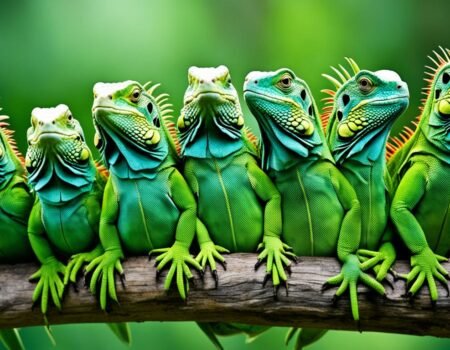Did you know that hamsters are one of the most popular small mammal pets in the United States? In fact, there are an estimated 3.5 million hamsters kept as pets across the country!
Hamsters may be small, but they bring big joy to their owners. And just like any other pet, they deserve the best care and attention. That’s why hamster insurance is becoming increasingly popular among pet owners who want to provide comprehensive medical coverage for their furry friends.
Hamster insurance offers a range of coverage options for various health conditions and accidents that hamsters may experience. It ensures that you can provide the best care for your pet without worrying about the financial burden of veterinary expenses. With hamster insurance, you can even get cash back on eligible veterinary exams and treatments!
Key Takeaways:
- Hamsters are one of the most popular small mammal pets in the United States.
- Hamster insurance offers coverage for various health conditions and accidents.
- It provides financial protection and peace of mind for hamster owners.
- Cash back on eligible veterinary exams and treatments is available with hamster insurance.
- Hamster insurance ensures that you can provide the best care for your pet without the worry of expensive veterinary expenses.
Coverage for Small Mammals
Hamster insurance offers comprehensive coverage for a variety of small mammals, ensuring that their healthcare needs are met without breaking the bank. This insurance extends beyond just hamsters, providing protection for other beloved small pets such as chinchillas, gerbils, guinea pigs, hedgehogs, mice, and rats. It’s important for pet owners to have insurance that covers the unique health concerns of these furry friends.
With small mammal insurance, pet owners can enjoy peace of mind knowing that their pets are protected against common health issues. Some of the conditions covered by small mammal insurance include:
- Overgrown teeth
- Eye infections
- Bladder infections
- Upper respiratory infections
- Internal parasites
- Arthritis
- Non-cancerous masses
- Diarrhea
- Abscesses
These treatments can often cost between $50 and $550. However, with small mammal insurance coverage, the member’s net cost can be significantly reduced. This ensures that owners can provide the best care for their small pets without worrying about the financial burden.
| Condition | Average Treatment Cost |
|---|---|
| Overgrown Teeth | $50 – $100 |
| Eye Infections | $75 – $150 |
| Bladder Infections | $80 – $200 |
| Upper Respiratory Infections | $100 – $300 |
| Internal Parasites | $150 – $400 |
| Arthritis | $200 – $500 |
| Non-cancerous Masses | $250 – $550 |
| Diarrhea | $80 – $150 |
| Abscesses | $100 – $250 |
By investing in small mammal insurance, pet owners can ensure that their cherished companions receive the necessary care and attention when they need it most. This coverage offers peace of mind and financial protection, allowing pet owners to focus on providing love and care for their small pets.
Coverage for Birds
In addition to providing coverage for small mammals, such as hamsters, hamster insurance also offers comprehensive coverage for birds. This includes a range of avian species, such as African greys, amazons, canaries, cockatiels, cockatoos, finches, lovebirds, macaws, parakeets, parrotlets, and toucans. With hamster insurance, pet owners can ensure that their feathered friends receive the necessary medical care and attention they deserve.
The coverage for birds includes protection against various health conditions commonly experienced by avian pets. This includes excessive egg laying, soft tissue trauma, diarrhea, runny nose, liver disease, internal parasites, upper respiratory infections, dehydration/constipation, and arthritis. Hamster insurance provides financial support for these treatments, helping bird owners provide the best possible care for their feathered companions. The average costs of these treatments can range from $99 to $396, depending on the specific condition and veterinary care required.
By investing in bird insurance, pet owners can have peace of mind knowing that their avian companions are protected. Whether it’s routine check-ups or unexpected medical emergencies, hamster insurance acts as a safety net, ensuring that birds can receive prompt veterinary attention without the added financial burden.
Coverage for Reptiles and Amphibians
Hamster insurance doesn’t just stop at covering hamsters. It also provides comprehensive coverage for reptiles and amphibians, ensuring that owners can protect their scaly and slippery companions. Whether you have a toad, bearded dragon, chameleon, gecko, iguana, snake, or tortoise, hamster insurance offers the necessary financial security to address a variety of health conditions.
Reptiles and amphibians can encounter a range of ailments and injuries. With hamster insurance, owners can have peace of mind knowing that their pets are covered for:
- Diarrhea
- Dehydration/constipation
- Upper respiratory infections
- Soft tissue trauma
- Eye infections
- Skin infections
- Systemic bacterial infections
- Abrasions
- Low blood calcium levels
These ailments can lead to discomfort and potentially serious health issues for reptiles and amphibians. By opting for hamster insurance, owners can ensure that their pets receive the necessary veterinary care without being burdened by expensive bills.
While the average costs of these treatments can range from $99 to $323, Nationwide members can enjoy significant savings. Hamster insurance not only provides financial protection but also promotes responsible pet ownership by making veterinary care more accessible and affordable.
To illustrate the potential savings and benefits of hamster insurance for reptiles and amphibians, consider the following table:
Ineligible Species
While hamster insurance covers a wide range of small mammals, birds, reptiles, and amphibians, there are certain species that are not eligible for coverage. It’s important for pet owners to be aware of these ineligible species before purchasing hamster insurance to ensure they are adequately protected. The following are examples of species that typically fall under the pet insurance restrictions:
- Venomous or poisonous species
- Endangered or threatened species
- Species that require a permit or registration
- Species that are illegal to own
- Hybrids of domesticated pets with wild species
- Species kept in flocks or on display
- Any other species not listed as eligible
It’s crucial for pet owners to thoroughly review the eligibility requirements provided by the insurance provider to determine if their specific pet species qualifies for coverage. Understanding these restrictions will help pet owners make informed decisions and ensure they have the appropriate insurance plan in place for their beloved pets.
If you have any doubts about the eligibility of your pet species, it’s recommended to consult with the insurance provider directly to receive accurate information. Knowing which species are ineligible for coverage will help pet owners avoid any potential misunderstandings or discrepancies in their insurance policies.
Is Hamster Insurance Worth It?
The decision to get hamster insurance ultimately depends on the individual pet owner. While some hamsters may not require extensive medical care, others may develop chronic conditions or require frequent veterinary visits. The cost of hamster insurance can vary depending on the coverage and provider. It’s essential for pet owners to assess the potential medical needs of their hamster and consider the financial implications. For those with hamsters that have had costly medical expenses in the past, hamster insurance can provide peace of mind and financial protection.
Hamster insurance offers a range of benefits that can make it worth considering for pet owners. By having a policy in place, owners can have peace of mind knowing that their hamster’s medical expenses will be covered.
Here are some key factors to consider when deciding if hamster insurance is worth it:
- Cost of veterinary care: Hamsters, like all pets, can require medical treatment throughout their lives. From routine check-ups to more serious issues, veterinary care can be expensive. Hamster insurance can help offset these costs and make quality healthcare more affordable.
- Potential medical conditions: While not all hamsters will experience serious health issues, some may develop conditions that require ongoing treatment. This can include dental problems, respiratory issues, or even tumors. Hamster insurance can provide coverage for these conditions, ensuring that your furry friend receives the care they need without breaking the bank.
- Emergency situations: Accidents can happen at any time, and hamsters are not immune to them. Whether it’s a fall, an injury, or an illness that requires immediate attention, having hamster insurance can help cover the costs of emergency veterinary care.
- Peace of mind: Owning a pet comes with responsibilities, and ensuring their well-being is one of them. With hamster insurance, you can have peace of mind knowing that you can provide the best possible care for your hamster without worrying about the financial burden.
“Hamster insurance provides financial protection and peace of mind for pet owners, ensuring that they can provide the best care for their furry friends.”
While the cost of hamster insurance varies depending on factors such as coverage, deductibles, and the provider, it can be a worthwhile investment for many pet owners. By comparing different insurance plans and considering your hamster’s specific needs and potential medical expenses, you can make an informed decision about whether hamster insurance is worth it for you.
| Factors to Consider | Benefits of Hamster Insurance |
|---|---|
| Cost of veterinary care | Helps to offset expensive medical expenses |
| Potential medical conditions | Provides coverage for ongoing treatments |
| Emergency situations | Covers the costs of unforeseen accidents and illnesses |
| Peace of mind | Ensures you can provide the best care without financial worries |
Ultimately, whether hamster insurance is worth it for you depends on your personal circumstances and your commitment to providing the best possible care for your hamster. By weighing the potential benefits and costs, you can make an informed decision that aligns with your pet’s needs and your financial situation.
Benefits of Multi-Pet Insurance
For pet owners with multiple pets, including hamsters, multi-pet insurance can offer significant benefits. It allows pet owners to insure all their pets under a single policy, reducing paperwork and simplifying the management of insurance. Additionally, many pet insurance companies offer discounts for insuring multiple pets, which can lead to cost savings on premiums. With multi-pet insurance, pet owners can ensure that all their furry friends are covered and can receive the necessary veterinary care without incurring large out-of-pocket expenses.
Here are some key benefits of multi-pet insurance:
- Convenience: Insuring multiple pets under a single policy is more convenient than managing separate policies for each pet. Pet owners only need to deal with one insurer, one premium, and one set of policy documentation.
- Reduced Paperwork: By having a single policy for multiple pets, pet owners can save time on filling out multiple insurance forms and managing individual policies. This can simplify the administrative tasks associated with pet insurance.
- Cost Savings: Many pet insurance providers offer discounts for insuring multiple pets. These discounts can result in significant cost savings on premiums, making pet insurance more affordable for pet owners with multiple furry companions.
- Comprehensive Coverage: With multi-pet insurance, pet owners can ensure that all their pets are covered for a wide range of health conditions and medical treatments. This comprehensive coverage provides peace of mind knowing that their pets have access to quality veterinary care.
Having multi-pet insurance not only provides financial protection but also simplifies the management of insurance for pet owners. It makes it easier to provide proper healthcare for all their pets without the worry of expensive vet bills.
| Pet Insurance Benefits | Hamster | Savings |
|---|---|---|
| Convenience | ✓ | – |
| Reduced Paperwork | ✓ | – |
| Cost Savings | ✓ | Up to 20% on premiums |
| Comprehensive Coverage | ✓ | – |
Top Pet Insurance Companies for Multi-Pet Coverage
When it comes to insuring multiple pets, it’s important to choose a pet insurance company that offers comprehensive coverage and discounts. Here are some of the top pet insurance companies that provide multi-pet coverage and discounts for pet owners with multiple pets:
| Insurance Company | Multi-Pet Coverage | Discounts |
|---|---|---|
| Nationwide | Insure multiple pets under a single policy | Discounts available for multiple pets |
| Embrace | Insure multiple pets under a single policy | Discounts available for multiple pets |
| ASPCA | Insure multiple pets under a single policy | Discounts available for multiple pets |
| Figo | Insure multiple pets under a single policy | Discounts available for multiple pets |
| Veterinary Pet Insurance (VPI) | Insure multiple pets under a single policy | Discounts available for multiple pets |
| Pets Best | Insure multiple pets under a single policy | Discounts available for multiple pets |
| Progressive | Insure multiple pets under a single policy | Discounts available for multiple pets |
| GEICO | Insure multiple pets under a single policy | Discounts available for multiple pets |
| American Kennel Club (AKC) | Insure multiple pets under a single policy | Discounts available for multiple pets |
| USAA | Insure multiple pets under a single policy | Discounts available for multiple pets |
| Petco | Insure multiple pets under a single policy | Discounts available for multiple pets |
| Hartville | Insure multiple pets under a single policy | Discounts available for multiple pets |
These pet insurance companies offer the convenience of insuring multiple pets under a single policy, saving pet owners from the hassle of managing multiple insurance plans. Additionally, they provide discounts on premiums, making it more affordable to protect all your pets. It’s recommended to compare the coverage and rates offered by each company to find the best fit for your multi-pet insurance needs.
Benefits of Multi-Pet Insurance Policies
Multi-pet insurance policies offer several benefits for pet owners. Firstly, they allow pet owners to have a single monthly premium for all their pets, simplifying billing and payment. With just one insurance policy to manage, pet owners can avoid the hassle of juggling multiple policies, making it easier to keep track of their furry friends’ coverage.
Additionally, multi-pet insurance policies come with discounted prices. Many insurance companies offer discounts on additional pets’ policies, allowing pet owners with multiple pets to enjoy significant cost savings. This not only makes pet insurance more affordable but also encourages pet owners to provide comprehensive coverage for all their beloved companions.
By opting for a multi-pet insurance policy, pet owners can ensure that all their pets are protected with the same level of care and attention. Whether it’s a hamster, a cat, a dog, or any other pet, they can all receive the necessary veterinary care without incurring large out-of-pocket expenses.
“With a multi-pet insurance policy, pet owners can have peace of mind knowing that their furry family members are well taken care of. It’s a convenient and cost-effective way to provide comprehensive coverage for all your pets.”
In short, multi-pet insurance policies offer convenience, cost savings, and comprehensive coverage for pet owners with multiple pets. It’s a smart choice for pet owners who want to ensure the well-being of all their furry family members while keeping their budget in check.
| Benefits of Multi-Pet Insurance Policies |
|---|
| 1. Simplified Billing and Payment – A single monthly premium for all pets |
| 2. Discounted Prices – Cost savings on additional pets’ policies |
| 3. Comprehensive Coverage – Ensures all pets receive the necessary veterinary care |
Importance of Pet Insurance for Multiple Pets
Having pet insurance for multiple pets is essential for providing the best care and ensuring the well-being of your furry family members. As pet owners, we want to give our beloved pets everything they need to live healthy and happy lives. But as the number of pets in a household increases, so do the associated costs, including veterinary expenses.
Pet insurance is a valuable tool that can help alleviate the financial burden and provide peace of mind. It covers a significant portion of veterinary costs, including accidents, illnesses, and wellness procedures, for all the insured pets. With pet insurance, you can focus on giving your pets the care they deserve, without worrying about the high costs of veterinary treatments.
Multi-pet insurance policies are particularly advantageous for owners with multiple pets. By having a single insurance policy that covers all of your pets, you can streamline billing and payment processes. Managing multiple pets’ insurance becomes simpler with a single policy and account. Additionally, many pet insurance companies offer discounts on premiums for insuring multiple pets, resulting in significant cost savings.
Whether you have a hamster, birds, reptiles, or any other pets, having pet insurance for multiple pets is a responsible choice. It ensures that all your furry friends have access to the necessary veterinary care whenever they need it. With pet insurance, you can provide the best possible care for your pets, giving them a happy and healthy life.
FAQ
What is hamster insurance?
Hamster insurance provides coverage for various health conditions and accidents that hamsters may experience. It offers financial protection and peace of mind for hamster owners, ensuring that they can provide the best care for their furry friends.
What does hamster insurance cover?
Hamster insurance covers a variety of health issues that hamsters may face, including overgrown teeth, eye infections, bladder infections, upper respiratory infections, internal parasites, arthritis, non-cancerous masses, diarrhea, and abscesses.
Can I get insurance for other small mammals?
Yes, hamster insurance also provides coverage for other small mammals like chinchillas, gerbils, guinea pigs, hedgehogs, mice, and rats.
Does hamster insurance cover birds?
Yes, hamster insurance also provides coverage for various birds, including African greys, amazons, canaries, cockatiels, cockatoos, finches, lovebirds, macaws, parakeets, parrotlets, and toucans.
Can I get insurance for reptiles and amphibians?
Yes, hamster insurance also includes coverage for reptiles and amphibians like toads, bearded dragons, chameleons, geckos, iguanas, snakes, and tortoises.
What species are ineligible for hamster insurance?
Ineligible species for hamster insurance include venomous or poisonous species, endangered or threatened species, species that require a permit or registration, species that are illegal to own, hybrids of domesticated pets with wild species, species kept in flocks or on display, and any other species not listed as eligible.
Is hamster insurance worth it?
The decision to get hamster insurance ultimately depends on the individual pet owner. It’s essential for pet owners to assess the potential medical needs of their hamster and consider the financial implications. For those with hamsters that have had costly medical expenses in the past, hamster insurance can provide peace of mind and financial protection.
What are the benefits of multi-pet insurance?
Multi-pet insurance allows pet owners to insure all their pets under a single policy, reducing paperwork and simplifying the management of insurance. Additionally, many pet insurance companies offer discounts for insuring multiple pets, which can lead to cost savings on premiums.
Which are the top pet insurance companies for multi-pet coverage?
Some of the top pet insurance companies that offer multi-pet coverage include Nationwide, Embrace, ASPCA, Figo, Veterinary Pet Insurance (VPI), Pets Best, Progressive, GEICO, American Kennel Club (AKC), USAA, Petco, and Hartville.
What are the benefits of multi-pet insurance policies?
Multi-pet insurance policies offer several benefits, including simplifying billing and payment with a single monthly premium, easier management of multiple pets’ insurance with a single policy and account, and discounted prices with discounts on additional pets’ policies.
Why is pet insurance important for multiple pets?
Having pet insurance for multiple pets helps to alleviate the financial burden of veterinary expenses. It provides reimbursement for accidents, illnesses, and wellness procedures for all the insured pets, ensuring that pet owners can provide the best possible care without worrying about high costs.












No Comment! Be the first one.